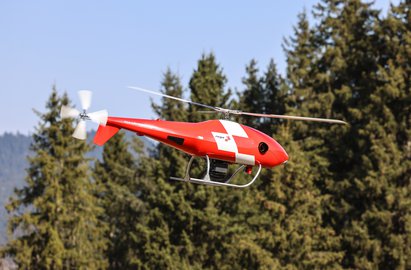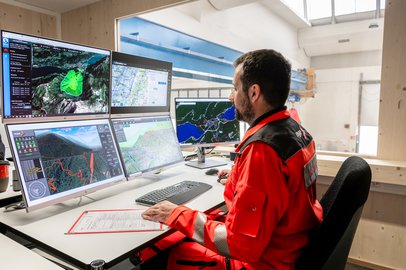On 27 April 2022, Rega celebrates its 70th anniversary. What began with courageous pioneers in the 1950s is today one of the most modern air rescue organisations in the world and forms an integral part of the Swiss healthcare system. This development is characterised by Rega’s resolve to use cutting-edge technology to help people in distress. Rega’s drone system and the Rega app are just two examples of how, seven decades later, Rega is still continually searching for ways of further improving its air rescue services for the benefit of the Swiss population.
Search flights with a Rega helicopter
If there is good reason to believe that a person has gone missing and is probably in urgent need of help, Rega’s Operations Centre initiates a rescue search. To do this, it has various resources at its disposal. A search flight with the nearest Rega helicopter and a crew who are familiar with the area is a sensible and swift initial measure in daylight if, for instance, the planned route of a missing hiker is known. For search flights in the dark, Rega has a search helicopter that is fitted, among other things, with an IR/EOS multi-sensor search system, a highly sensitive thermal imaging camera and a mobile phone location device. The Rega search helicopter is on standby for search missions around the clock at the Wilderswil base. If, for example, poor visibility prevents a helicopter from taking to the air, the Rega drone can be deployed along with ground-based mountain rescuers from the Swiss Alpine Club SAC.
The Rega drone goes into action when the search helicopter has to remain on the ground
Over the last few years, the drone system has continually been developed further. After conducting comprehensive tests under all kinds of conditions and subsequently finetuning the individual components, since autumn 2021 the Rega Operations Centre has been able to deploy the drone – which bears the designation "RGA-UAV-T1A" – for search operations. The drone can autonomously scan large search areas and is equipped with various sensors. With the airborne mobile phone location device, "Lifeseeker", the drone is able to locate a mobile phone with an accuracy of a few metres, even if there is no mobile phone coverage in the search area. In addition, a human detection pipeline was designed for the drone. Thanks to a self-learning algorithm, this system can automatically detect persons in the terrain on the real-time images delivered by the thermal imaging camera and relay this data to the Rega drone specialist, who coordinates the search operation and the subsequent rescue mission from his workplace at the helicopter base in Wilderswil.
Rega app: making the tried-and-tested even better
A further example of innovation for the welfare of patients is the Rega app. The Rega app was launched back in 2011 and was the first emergency app in Switzerland that could be used to transmit location data to an emergency call centre. Since then, it has been downloaded over 1.6 million times and has proved its worth in thousands of rescue missions. Rega has further improved the app and it is now even more intuitive to use. With this latest version of the app, Rega is also laying the technical foundations for future upgrades.
Mission coordinates are transmitted directly into the cockpit
The greatest advantage when raising the alarm via the Rega app is that the caller’s location is automatically transmitted to Rega’s Operations Centre. A phone connection is set up with the Operations Centre and the location of the person raising the alarm is displayed on a map. Subsequently, the flight coordinator initiates the rescue and transmits the coordinates of the accident site directly into the cockpit of the Rega helicopter that is being deployed. This makes it easier for the helicopter crew to find the accident site and saves valuable time in an emergency.
Fact sheets, images and video material on the Rega drone and the Rega app, as well as further documents relating to the Media Conference, are available in electronic form at:www.rega.ch/media
Rega in 2021
Rega can look back on a record year: in 2021, the Operations Centre at Zurich Airport organised a total of 18,017 missions, 10.7 percent more than in the previous year. That is equivalent to an average of around 50 missions per day. Both the rescue helicopters with 14,330 missions (+8.1 %) and the ambulance jets with 858 missions (+32.6 %) were in the air more frequently than in 2020. This growth in the number of repatriations is attributable to increased travel activity on the part the population compared to the first year of the pandemic. The Rega crews attended to a total of 12,284 patients (+10.3 %), which corresponds to approximately 34 patients a day. Further information about Rega’s missions in 2021 can be found in the press release dated 1 February 2022.
53,000 new patrons in 2021
Rega’s patrons enable it to provide air rescue services for the Swiss population with their annual contributions. Rega was delighted to welcome 53,000 new patrons as per the end of 2021, which by way of comparison is roughly equivalent to the population of the city of Biel. As of 31 December 2021, a total of 3,678,000 patrons were supporting Rega.
The Rega business year 2021
In 2021, Rega’s operating revenue totalled CHF 205.4 million, while the operating expenditure came to CHF 187.9 million. This resulted in a positive operating result of CHF 17.6 million. The annual result amounted to CHF 29.8 million. Rega’s patrons covered around 63.5 percent of the overall costs with their patronage contributions, donations and bequests. The remaining amount was mainly covered by cost bearers, such as insurance companies, in the form of payments for the rescue services provided.


